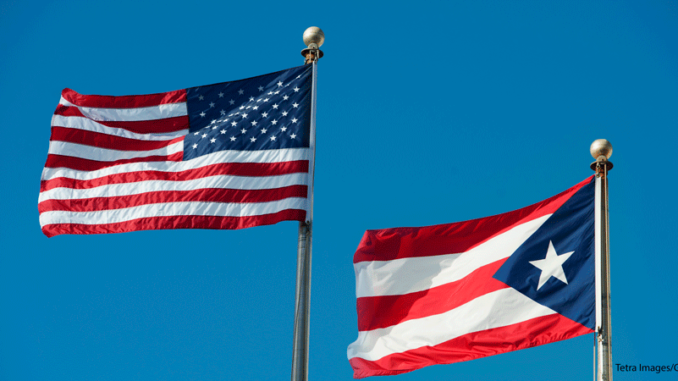
Federal Funding to Puerto Rico Ends
Puerto Rico is home to 3.4 million American citizens. Nearly two months after Hurricane Maria devastated the island, many Puerto Ricans still do not have reliable access to food, water, electricity, or health services. And now, federal disaster relief funding from the United States–never sufficient in the first place–has ended, leaving people to ask what’s next for this troubled region.
One complication is that Puerto Rico already had major problems before Hurricane Maria ever hit, including poverty and aging infrastructure. (The island has been in an economic recession since 2006, and their government was already $70 billion in debt, meaning that there was little money to pay for important social services.) Now, after the storm, what money they have must be used to fund immediate life-saving efforts and rebuild only the most critical infrastructure. The cost of rebuilding the island after Maria is currently estimated to be about $95 billion.
The Trump administration has made it clear that while they will help with immediate disaster relief, they don’t believe in helping Puerto Rico out in the long term. After Superstorm Sandy in 2012, the federal government provided tens of billions of dollars to help repair and rebuild New York City and other parts of the East Coast. Without sustained and consistent federal support to Puerto Rico, conditions will continue to deteriorate on the island, and we will likely see hundreds of thousands of Puerto Rican refugees depart their home for the mainland.
What Do You Think?: In your opinion, why was the federal government more willing to donate funds to help repair damages in New York than in Puerto Rico?
Senate Reveals Tax Cut Plan
Last week, btw took a look at the new tax cut plan proposed by the House of Representatives and President Trump. On Thursday, the Senate revealed its own version of the new tax cut plan. The two plans are similar in one key way: they both prioritize cutting corporate (business) and individual taxes. However, there are also some important differences.
Most notably, the Senate has suggested delaying until 2019 President Trump’s plan to cut the corporate tax rate by 20 percent. The Senate has also recommended reinstating some of the middle-class tax breaks that the president wanted to remove. This could lead to some pushback from the White House.
The Senate version also has a provision in it that prevents large multinational corporations from keeping their money overseas. This provision could raise more than $130 billion over the next ten years. Even so, many lawmakers worry that this won’t go far enough. Both of the proposed tax cut plans will potentially plunge the nation deeper into debt. It’s estimated that over the next ten years, the Senate plan will add $1.5 billion to the federal deficit.
Meanwhile, the House responded to the unpopularity of its tax cut plan by coming up with a 29-page amendment that revised some of its more controversial provisions. For example, the amendment reinstates the tax credit for adoptions.
What Do You Think?: In your opinion, which is more important: preventing the nation from plunging further into debt, or giving tax cuts to businesses and middle-class families? Why?
Yemen Blockade Turns Deadly
Yemen is the poorest country in the Arab world. This past summer, btw took a look at the civil war (now in its third year) and the deadly cholera outbreak there. Now, Yemen faces a new crisis: a blockade by Saudi Arabia, which could lead to widespread famine and death.
Last week, a missile was fired into the Saudi Arabian capital city by an Iran-backed rebel group. Saudi Arabia held Yemen accountable, shutting down its borders under the pretense of performing an investigation. But days later, they were still not allowing any humanitarian aid into or out of the country. At least three United Nations planes carrying supplies have been stopped. Critical supplies, such as medicine and chlorine tablets necessary to prevent cholera, can’t get through. The World Food Program, which is the part of the UN that fights hunger, has been feeding seven million people a month in Yemen. Now, however, it can’t get any food or other supplies past the barricade. The UN estimates that if the blockade isn’t lifted, millions will die in what will be the worst famine the world has seen in decades.
Before the blockade, an estimated 17 million people in Yemen were already hungry. A million have suffered from the cholera outbreak that has ravaged the country since June. Unless circumstances change, the situation in Yemen will quickly become catastrophic.
What Do You Think?: In your opinion, should the United States intervene in the situation in Yemen? Why or why not?
New Revelations About Hillary Clinton’s Campaign

When you think back on last year’s presidential election, you probably remember it as a contest between Hillary Clinton and now-President Trump. Before that, however, it was a battle between Hillary Clinton and Bernie Sanders for the Democratic party’s nomination. That race was so divisive that many Bernie supporters refused to ever back Clinton, and that lack of unity within the Democratic party may have helped contribute to her loss.
Now, Donna Brazile, a political strategist and the former interim chair of the Democratic National Committee, has written a new book called Hacks. In it, she states that she found proof that the 2016 Democratic presidential primary was rigged so that Hillary Clinton, and not Bernie Sanders, would win. The reason for this, she claims, is that the Democratic party was deeply in debt, and the Clinton campaign had promised to donate $2 million to the party if Clinton won the nomination.
The same day the book was released, however, Brazile appeared on CBS News and said that she’d found no evidence that the primary was rigged at all. And the $2 million “donation” Brazile refers to was really just a joint fundraising agreement, or JFA, which is a perfectly common and legal relationship between the candidate and his or her party (basically, they are an agreement to raise funds together). There is a limit to how much money a person can donate to an individual candidate, but no limit on how much can be donated to the party. So it’s very common practice for big donors to donate large sums to the party, with the understanding that the money will be used to help a particular candidate.
Today, Hillary and Bernie supporters finally have something they can agree on: that Brazile’s book has come out far too late to matter, and that her accusations and inconsistencies don’t do anything but further damage the reputation and unity of the Democratic party.
